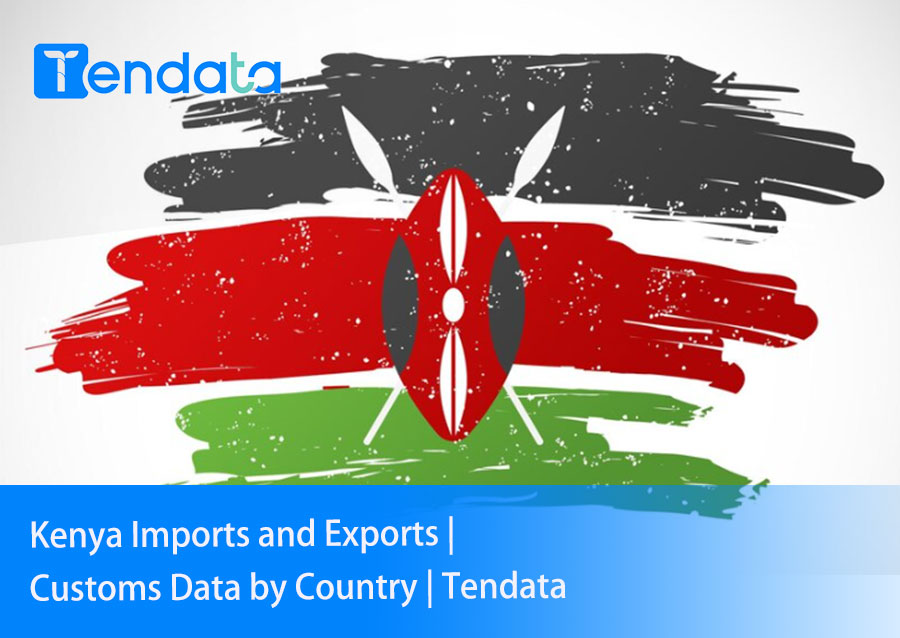 Trade Data
Trade Data
 01-11-2023
01-11-2023

Imports
Kenya's total imports of goods in 2022 are estimated at $21.1 billion. The total cost of Kenya's imports from 2021 to 2022 is 9.5% higher than the $19.3 billion at the beginning of the year.
Kenya's largest suppliers
The latest Tendata iTrader data shows that Kenya's imports are mainly purchased from exporters in the following countries: Mainland China (18.2% of Kenya's total), United Arab Emirates (16.4%), India (10.1%), Saudi Arabia (4.9%), Malaysia (4.8%), Japan (3.9%), the United States (3.8%), South Africa (2.5%), and the United States (3.8%). ), South Africa (2.5%), Tanzania (2.1%), South Korea (2%), Egypt (1.8%) and Uganda (1.6%).
Kenya's top 10 imports
1. mineral fuels including petroleum: $5.6 billion (26.5% of total imports)
2. machinery including computers: $1.4 billion (6.7%)
3. Iron and steel: $1.24 billion (5.9%)
4. Cereals: $1.2 billion (5.7%)
5. Animal and vegetable fats, oils, waxes: $1.16 billion (5.5%)
6. motors, equipment: $1.08 billion (5.1%)
7. Vehicles: $1.06 billion (5%)
8. plastics, plastic products: $971.9 million (4.6%)
9. Pharmaceuticals: $759.7 million (3.6%)
10. Paper, paper products: $488.9 million (2.3%)
Imported fossil fuels, including oil, are the fastest growing of Kenya's top 10 import categories, growing by 60% from 2021 to 2022. The second highest growth in Kenya's import purchases was in the category of paper, including paper products, which grew by 17.6%. Kenya's cereals imports ranked third in terms of growth, increasing by 16.3%. The category was driven by increased spending on maize, wheat and rice by international suppliers.
Two imported product categories recorded double-digit declines, namely automobiles (-23.3% from 2021) and machinery including computers (-11.2%).
Looking at the more detailed HTS codes, the top 10 imported products in Kenya are processed petroleum (24% of Kenya's imports), palm oil (5.1%), wheat (3.1%), dosage mixes of medicines (2.7%), thermally made products - rolled iron or non-alloyed steel (2.5%), automobiles (2%), semi-finished products of iron or non-alloyed steel (1.8%), rice (1.4%) ), telephone equipment including smartphones (1.3%) , and then fertilizer mixtures (1.2%).
Exports
Kenya exported $7.4 billion worth of products globally in 2022. Kenya's total export sales increased by 9.6% year-on-year from $6.74 billion in 2021.
Kenya's largest trading partners
The latest Tendata iTrader data shows that Kenya's major exports are purchased by importers from: Uganda (11.1% of Kenya's total exports), United States of America (9.2%), Netherlands (8 %), Pakistan (7.4%), Tanzania (6.6%), United Kingdom (5.12%), UAE (5.06%), Rwanda (4.6%), Mainland China (3.2%), Egypt (3.1%), South Asia Sudan (2.7%) and then the Democratic Republic of Congo (2%).
Kenya's top 10 exports
1. coffee, tea, spices: $1.7 billion (23.4% of total exports)
2. Live trees, plants, cut flowers: $694.2 million (9.4%)
3. fossil fuels, including petroleum: $450.8 million (6.1%)
4. Ores, slag, ashes: $335.9 million (4.5%)
5. Animal and vegetable fats, oils, waxes: $310.5 million (4.2%)
6. Fruits, nuts: $279.3 million (3.8%)
7. Clothing, accessories (not knitted or crocheted): $225.4 million (3%)
8. Vegetables: $215.5 million (2.9%)
9. Steel: $201.7 million (2.7%)
10. Knitted or crocheted clothing, accessories: $174.3 million (2.4%)
Mineral fuels, including petroleum, are the fastest-growing of the top 10 export categories, increasing 61.3 percent from 2021 to 2022. The second fastest growing export sales category is animal or vegetable fats, oils and waxes, which grew by 43.2%. Kenya's ores, slag and ash product category saw the third highest increase in shipments, with a 29.9% increase. The strongest driver of this growth was international sales of titanium ores and concentrates in Kenya.
Two items showed double-digit declines: vegetable exports from Kenya (down -28.7% from 2021) and live trees, plants and cut flowers (down -13.8%).
Looking at HSN tariff codes, tea, including flavored varieties, is Kenya's most valuable export, accounting for 18.7 percent of the African country's total exports. In second place were fresh or dried flowers for bouquets or decorative purposes (8.5%), followed by refined petroleum (5.7%), coffee (4.4%), titanium ores and concentrates (3.4%), palm oil (2.6%), dates, figs, pineapples, mangoes, avocados and guavas (2.3%), plated or coated articles made of flat iron or non-alloy steel (1.9%), dosage by Mixed medicines (also 1.9%), then non-knitted and non-knitted articles crocheted men's suits or pants (1.5%).
Category
Leave Message for Demo Request or Questions


 T-info
T-info T-discovery
T-discovery

 My
Tendata
My
Tendata Market Analysis
Market Analysis Customer
Development
Customer
Development Competitor
Monitoring
Competitor
Monitoring Customer Relationship
Customer Relationship





































































































































